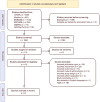Virtually delivered lifestyle interventions for overweight and obese pregnant people: A systematic review
- PMID: 40388534
- PMCID: PMC12089722
- DOI: 10.1177/17455057251336292
Virtually delivered lifestyle interventions for overweight and obese pregnant people: A systematic review
Abstract
Background: Gestational weight gain (GWG) impacts both foetal and maternal health outcomes, with excessive GWG in overweight and obese people further increasing the risk of complications for this population. Lifestyle changes including consuming a healthy diet and physical activity are core strategies for management. Since 2020 and the emergence of the COVID-19 pandemic, use of telehealth has increased; however, little is known about the effectiveness of virtually delivered strategies for maintaining healthy gestational weight during pregnancy.
Objectives: To describe the effect of virtually delivered lifestyle interventions on promoting healthy GWG and reducing maternal and foetal complications associated with excessive GWG, with the view to inform future clinical practice.
Design: This systematic review followed preferred reporting items for systematic reviews and meta-analysis (PRISMA) guidelines and targeted quantitative studies assessing virtually delivered lifestyle interventions for maintaining healthy gestational weight for overweight and obese pregnant individuals aged 18 and older.
Data sources and methods: Six databases (MEDLINE, CINHAL, EMBASE, EMCARE, MIDIRS and APA PsycINFO) were searched using a rigorous search strategy. Data extraction investigated mode of telehealth delivery, intervention type and GWG outcomes. Quality appraisal was conducted using the Critical Appraisal Skills Programme tool and risk of bias was assessed using the Risk of Bias assessment (RoB-2).
Results: Nine studies met inclusion criteria and within those studies, six different telehealth modalities were identified. Interventions varied and included GWG tracking, step counts, diet and exercise goal setting. Effectiveness of studies was inconsistent, with five studies demonstrating lower GWG.
Conclusion: Results suggest that lifestyle interventions delivered via telehealth may be effective at reducing excessive GWG. The development of targeted interventions integrated into obstetric guidelines aimed at reducing excessive GWG via telehealth platforms should be considered as a strategy not only for pandemic situations, but to increase antenatal care and service access.
Registration: PROSPERO International Prospective Register on 26 January 2023 (CRD42023392095).
Keywords: diet; exercise; gestational weight gain; nutrition; overweight; pregnancy.
Conflict of interest statement
Declaration of Conflicting InterestsThe authors declared no potential conflicts of interest with respect to the research, authorship, and/or publication of this article.
Figures
References
-
- Pairman S, Tracy SK, Dahlen HG, et al. Midwifery preparation for practice (Book 2), 5th ed. Elsevier, 2023.
-
- Institute of Medicine and National Research Council. Weight gain during pregnancy: reexamining the guidelines. In: Rasmussen KM, Yaktine AL. (eds) Weight gain during pregnancy: reexamining the guidelines. National Academies Press, 2009. - PubMed
Publication types
MeSH terms
LinkOut - more resources
Full Text Sources
Medical
Miscellaneous


